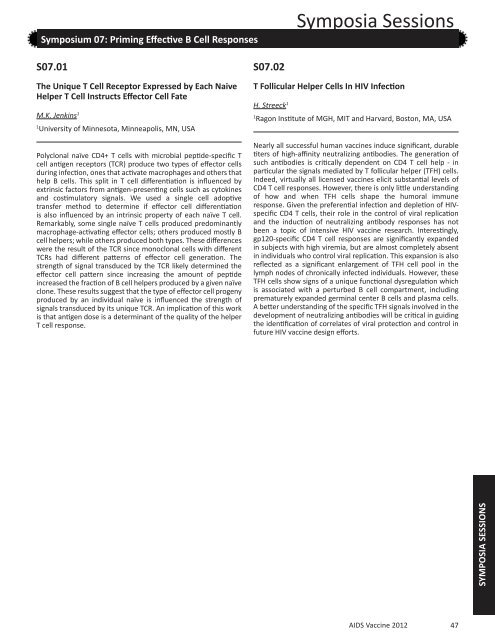Oral Abstract Session 01 - Global HIV Vaccine Enterprise
Oral Abstract Session 01 - Global HIV Vaccine Enterprise
Oral Abstract Session 01 - Global HIV Vaccine Enterprise
You also want an ePaper? Increase the reach of your titles
YUMPU automatically turns print PDFs into web optimized ePapers that Google loves.
Symposium 07: Priming Effective B Cell Responses<br />
S07.<strong>01</strong><br />
The Unique T Cell Receptor Expressed by Each Naive<br />
Helper T Cell Instructs Effector Cell Fate<br />
M.K. Jenkins 1<br />
1 University of Minnesota, Minneapolis, MN, USA<br />
Polyclonal naïve CD4+ T cells with microbial peptide-specific T<br />
cell antigen receptors (TCR) produce two types of effector cells<br />
during infection, ones that activate macrophages and others that<br />
help B cells. This split in T cell differentiation is influenced by<br />
extrinsic factors from antigen-presenting cells such as cytokines<br />
and costimulatory signals. We used a single cell adoptive<br />
transfer method to determine if effector cell differentiation<br />
is also influenced by an intrinsic property of each naïve T cell.<br />
Remarkably, some single naïve T cells produced predominantly<br />
macrophage-activating effector cells; others produced mostly B<br />
cell helpers; while others produced both types. These differences<br />
were the result of the TCR since monoclonal cells with different<br />
TCRs had different patterns of effector cell generation. The<br />
strength of signal transduced by the TCR likely determined the<br />
effector cell pattern since increasing the amount of peptide<br />
increased the fraction of B cell helpers produced by a given naïve<br />
clone. These results suggest that the type of effector cell progeny<br />
produced by an individual naïve is influenced the strength of<br />
signals transduced by its unique TCR. An implication of this work<br />
is that antigen dose is a determinant of the quality of the helper<br />
T cell response.<br />
S07.02<br />
Symposia <strong>Session</strong>s<br />
T Follicular Helper Cells In <strong>HIV</strong> Infection<br />
H. Streeck 1<br />
1 Ragon Institute of MGH, MIT and Harvard, Boston, MA, USA<br />
Nearly all successful human vaccines induce significant, durable<br />
titers of high-affinity neutralizing antibodies. The generation of<br />
such antibodies is critically dependent on CD4 T cell help - in<br />
particular the signals mediated by T follicular helper (TFH) cells.<br />
Indeed, virtually all licensed vaccines elicit substantial levels of<br />
CD4 T cell responses. However, there is only little understanding<br />
of how and when TFH cells shape the humoral immune<br />
response. Given the preferential infection and depletion of <strong>HIV</strong>specific<br />
CD4 T cells, their role in the control of viral replication<br />
and the induction of neutralizing antibody responses has not<br />
been a topic of intensive <strong>HIV</strong> vaccine research. Interestingly,<br />
gp120-specific CD4 T cell responses are significantly expanded<br />
in subjects with high viremia, but are almost completely absent<br />
in individuals who control viral replication. This expansion is also<br />
reflected as a significant enlargement of TFH cell pool in the<br />
lymph nodes of chronically infected individuals. However, these<br />
TFH cells show signs of a unique functional dysregulation which<br />
is associated with a perturbed B cell compartment, including<br />
prematurely expanded germinal center B cells and plasma cells.<br />
A better understanding of the specific TFH signals involved in the<br />
development of neutralizing antibodies will be critical in guiding<br />
the identification of correlates of viral protection and control in<br />
future <strong>HIV</strong> vaccine design efforts.<br />
AIDS <strong>Vaccine</strong> 2<strong>01</strong>2<br />
47<br />
SYMPOSIA SESSIONS


